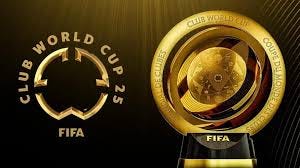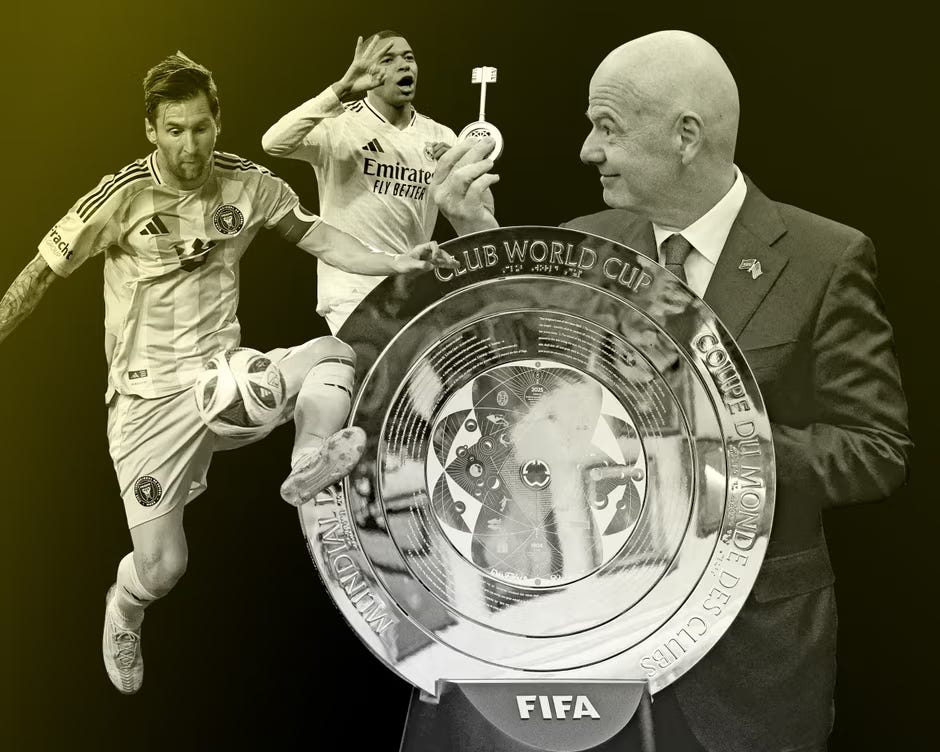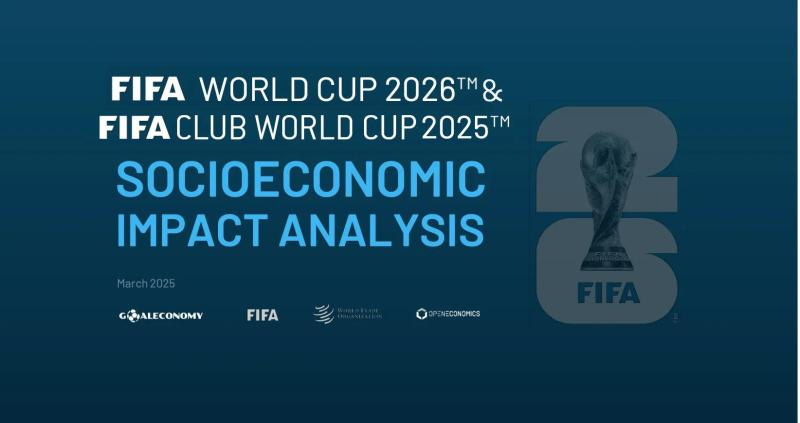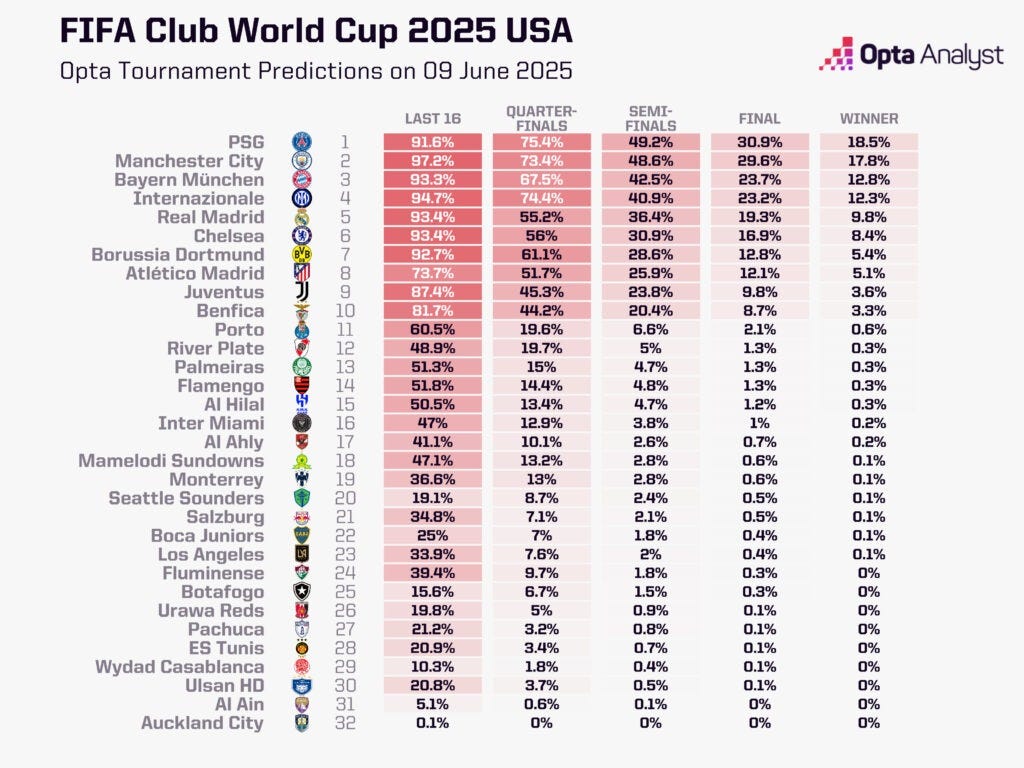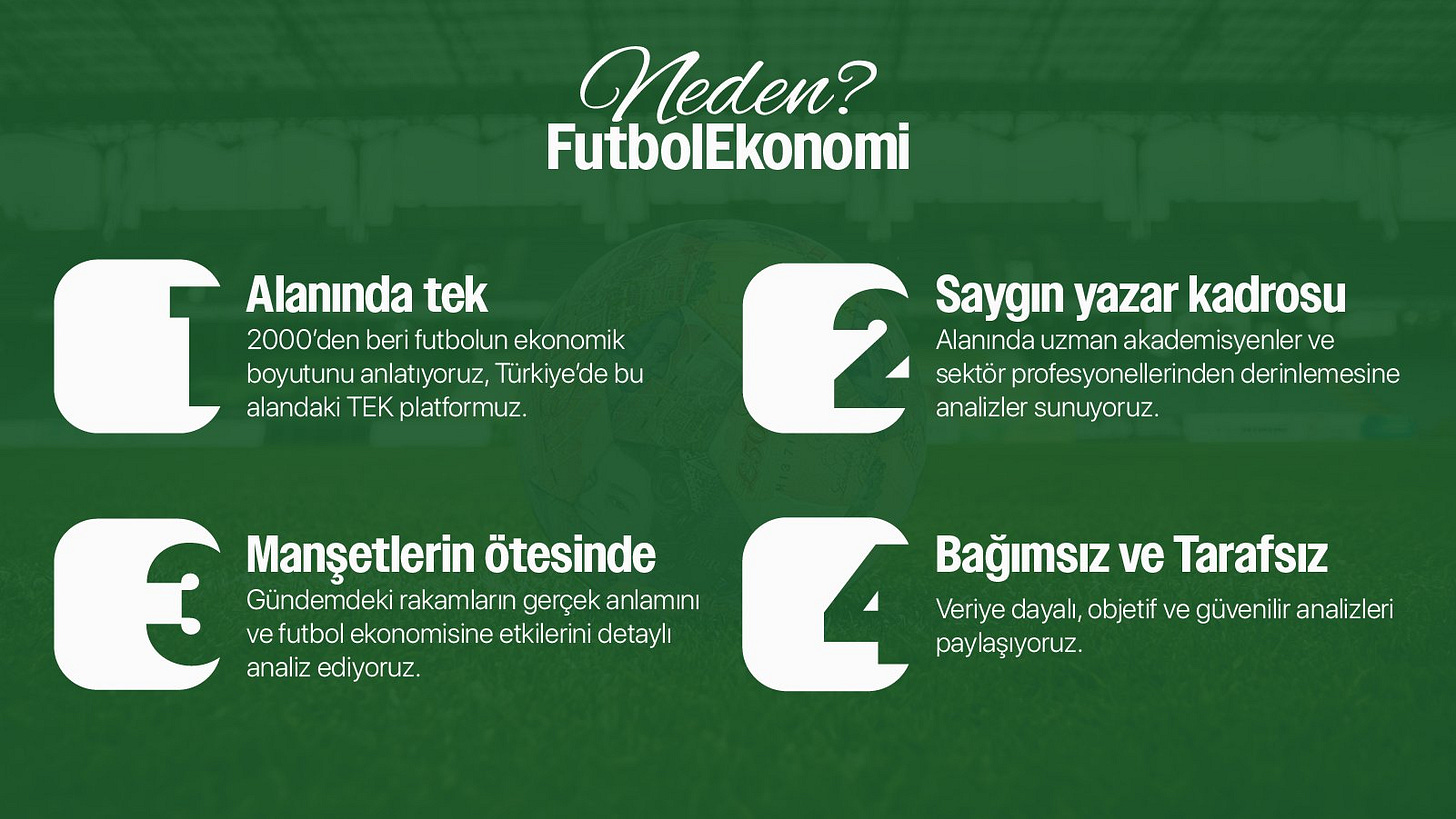Monthly Newsletter of Sports Economics: Ekospor-Issue #42 FIFA Club World Cup (FCWC) Economics
FIFA Club World Cup (FCWC) Economics
The FIFA Club World Cup (FIFA CWC) is an international men's association football competition organized by the Fédération Internationale de Football Association (FIFA), the sport's global governing body. The competition was first contested in 2000 as the FIFA Club World Championship. It was not held from 2001 to 2004 due to a combination of factors, chiefly the collapse of FIFA's marketing partner International Sport and Leisure (ISL). It returned in 2005 as an annual competition through 2023. Following the 2023 edition, the tournament was again revamped to a quadrennial competition starting in 2025. The Cup's prestige and stature have been subject to significant debate.
The first FIFA Club World Championship took place in Brazil in 2000, during which year it ran in parallel with the Intercontinental Cup, a competition played by the winners of the UEFA Champions League and the Copa Libertadores, with the champions of each tournament both retroactively recognized by FIFA as club world champions in 2017. In 2005, the Intercontinental Cup was merged with the FIFA Club World Championship, and in 2006, the tournament was renamed as the FIFA Club World Cup. The winner of the Club World Cup receives the FIFA Club World Cup trophy and a FIFA World Champions certificate.
The new format, which will come into effect with the 2025 edition, features 32 teams competing for the title at venues within the host nation: 12 teams from Europe, 6 from South America, 4 from Asia, 4 from Africa, 4 from North and Central America and the Caribbean, 1 from Oceania, and 1 team from the host nation. The teams are drawn into eight groups of four, with each team playing three group stage matches in a round-robin format. The top two teams from each group advance to the knockout stage, starting with the round of 16 and culminating with the final. mORE
Between June 14 and July 13, 2025, clubs from all over the world will be in action on the pitches of the United States to fight for the coveted trophy of the inaugural edition. FIFA +
The New FIFA Club World Cup: Format, Structure, and Financial Impact
The introduction of the new FIFA Club World Cup marks a major milestone in the commercialization and globalization of international club football. Starting in the summer of 2025, the tournament will be held in a new, expanded format. The following analysis outlines its structure, the differences from the previous Club World Cup, and the prize money distribution — all evaluated in an economic context. mORE..
Clubs qualified for inaugural FIFA Club World Cup 2025™
FIFA takes decision on last FIFA Club World Cup 2025™ participating team
Qualified as Continental champions
The following clubs represent the winners of each confederation’s premier club competition between 2021 and 2024. (For the UEFA Champions League, this relates to winners between the 2020-21 and 2023-24 seasons). mORE..
The Fifa Club World Cup, explained: everything you wanted to know about the tournament
The 2026 World Cup is what is technically known as the Proper World Cup, for national teams. This summer’s tournament is the Club World Cup, featuring some (with the emphasis on “some”) of the world’s best domestic teams – Real Madrid, PSG, River Plate and the like. mORE…
Composite: Guardian Picture Desk
Expert Analyses and Commentary
Recent reports underline the CWC’s economic scale. FIFA‑commissioned studies (OpenEconomics/WTO) stress the socioeconomic benefits: one analysis highlights the US tournament’s “unlock value” for local economies via attendance and spending. Media and analysts highlight the unprecedented finances: SportsBusiness Journal notes FIFA’s $2B revenue goal and $1B investment (including the prize fund), while feature articles have called the expanded event an “audacious,” billion‑dollar game‑changer in global soccer. Industry observers also point out FIFA’s new model: the federation now claims 73% higher revenues for 2023–26 vs the prior cycle, largely thanks to the CWC and World Cup.
FIFA-WTO study estimates USD 47 billion economic output from FIFA Club World Cup™ and FIFA World Cup™ in the US
FIFA and the World Trade Organization (WTO) Secretariat have released two studies that showcase the significant socioeconomic impact the forthcoming FIFA Club World Cup 2025™ and FIFA World Cup 2026™ could have in the United States and globally.
The studies – developed by OpenEconomics (OE), an independent body that supports institutions and companies in designing policies and investment projects – are the latest example of the collaboration between FIFA and the WTO since the release of the GoalEconomy initiative following the biggest and most successful FIFA Women’s World Cup™ ever in Australia and New Zealand in 2023.
Among the key estimates, the FIFA World Cup 2026 analysis highlights that across the host countries 6.5 million people are expected to attend the tournament. According to OE, the tournament could help drive up to USD 40.9 billion in Gross Domestic Product (GDP), deliver USD 8.28 billion in social benefits and underpin the creation of nearly 824,000 full time equivalent (FTE) jobs globally. Specifically for the US, OE estimates that 185,000 FTE jobs could be created, with 30.5 billion in gross output and USD 17.2 billion in GDP. Additionally, the FIFA Club World Cup 2025 study showcases mORE..
Each FIFA Club World Cup 2025™ host city to receive USD one million legacy commitment from FIFA
All host cities – Atlanta, Charlotte, Cincinnati, Los Angeles, Miami, Nashville, New York New Jersey, Orlando, Philadelphia, Seattle and Washington, DC – to benefit
FIFA President Gianni Infantino has announced that FIFA will make a legacy contribution of USD one million to each of the 11 cities that will host matches at the forthcoming FIFA Club World Cup 2025™, ensuring that the impact of the groundbreaking global tournament will be felt for years to come. mORE..
In line with the budgetary principles for the FIFA Club World Cup™ and following fruitful discussions with key stakeholders, including the European Club Association, as well as the approval of the FIFA Council, FIFA has confirmed the distribution model for its new club competition that includes USD 1 billion prize money for the 32 participating clubs, plus a substantial and groundbreaking global solidarity model. mORE..
Financial Aspects
Broadcast & Marketing: FIFA projects ~$2.0 billion in total revenues from the 2025 CWC. The bulk (≈75%) comes from broadcast and marketing rights (including a record $1 billion from DAZN’s global TV deal). Sponsorship and other commercial income are included in this category.
Ticketing & Hospitality: The remaining ≈25% of revenue (~$500 M) is expected from ticket sales, hospitality and local commercial rights. With 63 matches and a combined expected attendance of ~3.7 million fans, even modest average ticket prices generate hundreds of millions. (FIFA has emphasized broad access – e.g. early reports mentioned affordable prices starting around $40.)
Total Revenue: Overall FIFA’s revenue target is $2 billion for CWC 2025. This contributes to a projected $13 billion in revenues for FIFA’s 2023–26 cycle (including the 2026 World Cup) – about 73% higher than 2019–22.
Operations & Hosting Costs: FIFA plans to spend the entire $2 billion it raises. About $900 million is budgeted for staging/operations (venue rentals, logistics, security, pitch conversion, staffing, etc.). (For perspective, the tournament requires installing natural grass in some NFL stadiums, plus standard event infrastructure.)
Club Compensation (Prize Pool): A massive $1 billion prize pool will be distributed to the clubs. FIFA has said this is split into a $525 M “participation” pool (flat fees per team) and a $425 M performance pool based on results. For example, each MLS club is guaranteed about $9.55 M just for participating, with additional bonuses (LAFC’s playoff win earned an extra $250K). The champion club could earn up to ~$125 M under the payout structure. (Note: $1.0 B of the $1.1 B distribution pot is prize money; the remaining ~$100 M is a solidarity fund for non‑participating clubs.)
Economic Impact: Host cities and the country at large stand to gain significantly. FIFA and WTO economists estimate 3.7 million fans will attend across all matches. The joint impact analysis projects the Club World Cup alone could generate about $21.1 billion in global GDP (including ~$9.6 billion in U.S. GDP). It could also produce roughly $17.1 billion in gross output and 105,000 full-time jobs in the U.S.. Combined with the 2026 World Cup, FIFA calculates the two events will add roughly $62 billion to world GDP inside.fifa.com. In concrete terms, each host city expects boosts in tourism, hotel occupancy and retail during the month of games – similar to prior major events. mORE..
PIF joins FIFA Club World Cup sponsor roster
The Public Investment Fund (PIF), Saudi Arabia’s sovereign wealth fund, has joined as the newest financial sponsor of the FIFA Club World Cup 2025, following its official partnership with the inaugural tournament. mORE..
PIF and FIFA forge partnership for FIFA Club World Cup 2025™
The FIFA Club World Cup 2025™ will be played in 12 stadiums across 11 U.S. host cities. The 63-match tournament will culminate with what promises to be a spectacular final at MetLife Stadium New York New Jersey, on Sunday, July 13, when the FIFA club world champion will be crowned…mORE..
All tournament fixtures will be live-streamed for free on DAZN.com, bringing the excitement of the first edition of the competition to every football fan around the world. Tickets and ticket-inclusive hospitality packages are on sale via FIFA.com/tickets.
DAZN PAYS $1 BILLION FOR 2025 FIFA CLUB WORLD CUP RIGHTS
Streaming platform DAZN paid US$1 billion for the television rights to the 63 games of the 2025 FIFA Club World Cup, according to multiple reports.
FIFA Club World Cup 2025 mORE News
Who Will Win the Club World Cup 2025? Opta Supercomputer Predictions
Who will win the first expanded edition of the FIFA Club World Cup? We won’t know for sure until the final on 13 July, so for now it’s time to look at the Opta Supercomputer pre-tournament predictions.
The FIFA Club World Cup has been running for 25 years, but the tournament has never before been as big as it is for the upcoming 2025 edition.
The Opta supercomputer predicts it will be the leading European sides – including UEFA Champions League winners Paris Saint-Germain and five-time CWC victors Real Madrid – who will prove to be the teams to beat, but there are many other notable global powerhouses bidding for glory, including Brazilian side Palmeiras, Saudi Pro League standouts Al-Hilal, plus Argentine greats Boca Juniors and River Plate. mORE…
Official hospitality for the FIFA Club World Cup 2025™ now on sale
Ticket-inclusive official hospitality products for the FIFA Club World Cup 2025™ now available via FIFA.com/hospitality
Fans of the beautiful game, friends and families looking for unique experiences, or companies seeking to treat employees and guests can now secure ticket-inclusive official hospitality packages for the FIFA Club World Cup 2025™. From access to vibrant hospitality lounges to bespoke exclusive suites, these prime seats at some of the world’s most impressive sporting venues are now available online via FIFA.com/hospitality or through authorised sales agents. mORE..
FIFA Club World Cup 2025 wallchart
EKOSPOR CONGRESS
RHINE-RUHR 2025 FISU WORLD CONFERENCE 17-19 JULY 2025, JAHRHUNDERTHALLE BOCHUM
The International Association of Sports Economists (IASE) invites you to submit a paper for presentation at our 20th Conference, to be held in Las Vegas, Nevada. The conference will take place Tuesday-Wednesday, June 17 & 18, 2025, and is hosted by Nevada State University.
Play the Game 2025 Play the Game invites academics, journalists, athlete representatives, sports officials, supporter groups, and other stakeholders in sport to contribute their research, knowledge, and experiences at our next conference in Tampere, Finland, on 5-8 October 2025.
Spor Bilimleri Derneği (SBD) tarafından düzenlenmekte olan 23. Uluslararası Spor Bilimleri Kongresi 1-4 Aralık 2025 tarihleri arasında, Atatürk Üniversitesi ve Erzurum Teknik Üniversitesi ortak protokolünde Erzurum ilinde gerçekleştirilecektir.
EKOSPOR CORNER
Sports Economics Networking publishes scholarly research in the field of sports economics by Sebahattin Devecioğlu
Thanks for reading Monthly Newsletter of Sports Economics : Ekospor! Subscribe for free to receive new posts and support my work.


